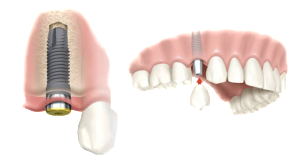Unlike baby teeth in children, when an adult loses their permanent teeth as a result of decay or even an accident, the only way to replace the missing gap is to get an implant. Dentists offer their patients many types of implants, some of which are made to look and feel like the real thing. For some people, however, the option is not available. Those with certain health conditions such as diabetes and even people who have had cancer in the past have until now been deemed ineligible for implants. The reason being that the body has to adjust to the foreign device; your jawbone has to shift and adapt to properly accommodate the implant, and this is where the trouble lies for many people.
An Implant Change for Jawbone Loss
Fortunately, a recent development by scientists at the Universitat Jaume I, an institute located in Castellón, may be the answer patients have been looking for. They have made an implant that features a biodegradable coating that will facilitate the jawbone integration process much faster than standard implants with titanium. Researchers believe the new prototype will be able to reduce patient waiting times up to two months, as dentists can now apply artificial crowns in due time.
Inside the Implant: What Makes the Prototype Successful
So, how does it work?
Well, according to Julio Jose Suay, the scientist that coordinated the development of the prototype, the key is in the biodegradable covering. It “upon contact with the bone, dissolves…[and is] able to release silicon compounds and other bioactive molecules which induce bone generation” (Science Daily). These words will offer a breath of fresh relief to the thousands of patients who have been unable to receive implants as soon as they would have liked. With this new technology, jawbone loss will no longer be a barrier.
A Stronger Coating for a Stronger Bond
Interestingly enough, the prototype has actually steered away from previous implant production methods, as those made currently consist of a rougher coating material that is aimed to integrate the objects into the jawbone. The research team in Castellón has now found, however, that it is better to let the body run its own course. The release of molecules by way of the biodegradable covering makes for an easier and stronger bond, something which is very important for every implant recipient. Traditional implants may work fine for people who have healthy jawbones, but they simply do not work for many others.
Read the full article here.

